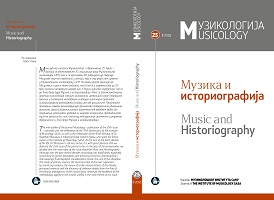Допринос Петра Коњовића конституисању и почецима рада Музиколошког института Српске академије наука и уметности
Petar Konjović’s Contribution to the Constitution and the Beginnings of the Institute of Musicology of the Serbian Academy of Sciences and Arts
Author(s): Biljana MilanovićSubject(s): Customs / Folklore, Music, Cultural Anthropology / Ethnology, Sociology of Art
Published by: Muzikološki institut SANU
Keywords: Petar Konjović; Institute of MusicologySAS/SASA; Department of Fine Arts and Music SAS/SASA; musicology; ethnomusicology;
Summary/Abstract: In the text I deal with the period of establishment and the beginnings of the work of the Institute of Musicology of the Serbian Academy of Sciences, which is marked by the role of composer and music writer Petar Konjović (1883– 1970), who founded and was the first director of the Institute (1947–1954). I examined and problematized Konjović’s efforts to establish and manage the institution, which were inseparable from his role of Fellow of the Academy and Secretary of the Department of Fine Arts and Music of the Serbian Academy of Sciences (1948–1954), through the analysis of archival documentation. The basic assumption that I started from was related to the interdependence between (1) the establishment of an institutional order and (2) the disciplining of scientific research in the direction of the emergence of musicology and ethnomusicology in the local context. In particular, issues related to the Institute’s relationship with the wider organizational environment and research policy of the SAN, as well as the role and support of its significant individuals in the process of the institutionalization of music science were especially highlighted.The problem of acquiring legitimacy in clearly hierarchical relationships proved to be very complex, since the Institute represented, on the one hand, a scientific unit of the Academy of Arts, that is, the Department of Fine Arts and Music, which, on the other hand, was marked by the inheritance of marginalized status of artists in comparison to other entities within the SAN. The formation of scientific tasks and objectives and the questions related to their realization were shaped in such a context. I analyzed these problems within three subchapters. The first of them provides basic information on the reorganization of the Serbian Academy of Sciences within the framework of the cultural policy of the new regime and deals with the aspects of the formal establishment of the Institute (1947) and the contextualization of the first programmatic projections of its work. The second question relates to the diverse problems that accompanied the delay of the start of the Institute’s activities, while the final subchapteris dedicated to the period from hiring the first associates to the end of Konjović’s directorship (1948–1954). Konjović’s strategies pointed to his simultaneous stability and flexibility in the design of thematic areas and methodological approaches.The policy of the scientific-research work of the Institute of Musicology from Konjović’s time can be outlined in several general aspects: reliance on pre-war experiences, without the destruction of inherited value canons, but with constant changes in the direction of widening the scope of processed material through research of hitherto neglected creative personalities, performing practices and institutions;melographed and studied folklore material from various rural and urban areas, including different national and ethnic communities; the establishment of completely new thematic areas in the local context that destabilize the concept of purely national science; the emphasis on interdisciplinarity and openness to communication and exchange of scientific and methodological experiences in the international context. Konjović’s position at the Serbian Academy of Sciences, his experience in managing various institutions, persistence and strategically planned actions, his high criteria and consideration in the selection of associates, managing without ideological divergences from his position of the bourgeois pre-war intellectual, but also his patient waiting for certain decisions of the competent instances, were crucial for the constitution and survival of the Institute of Musicology, within which the platform of musicological and ethnomusicological disciplines in Serbia was established in just a few years.
Journal: Muzikologija
- Issue Year: 2/2018
- Issue No: 25
- Page Range: 15-48
- Page Count: 34
- Language: Serbian

